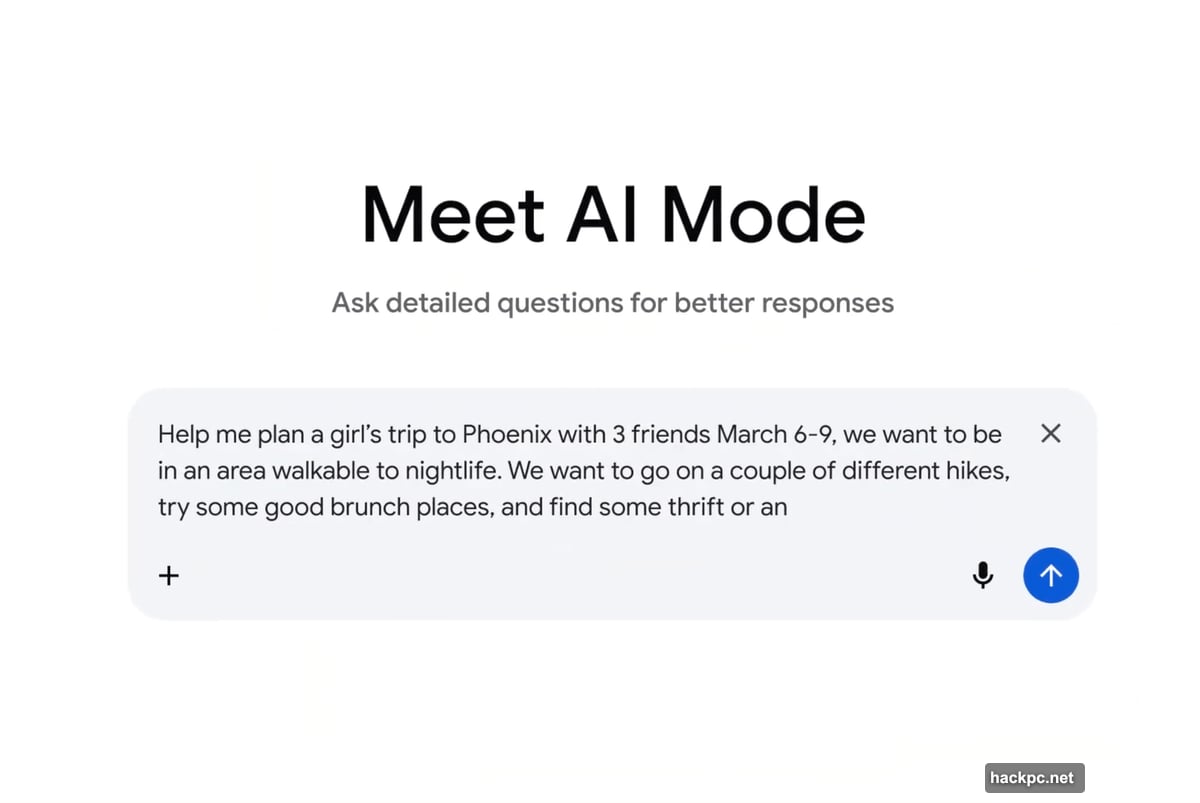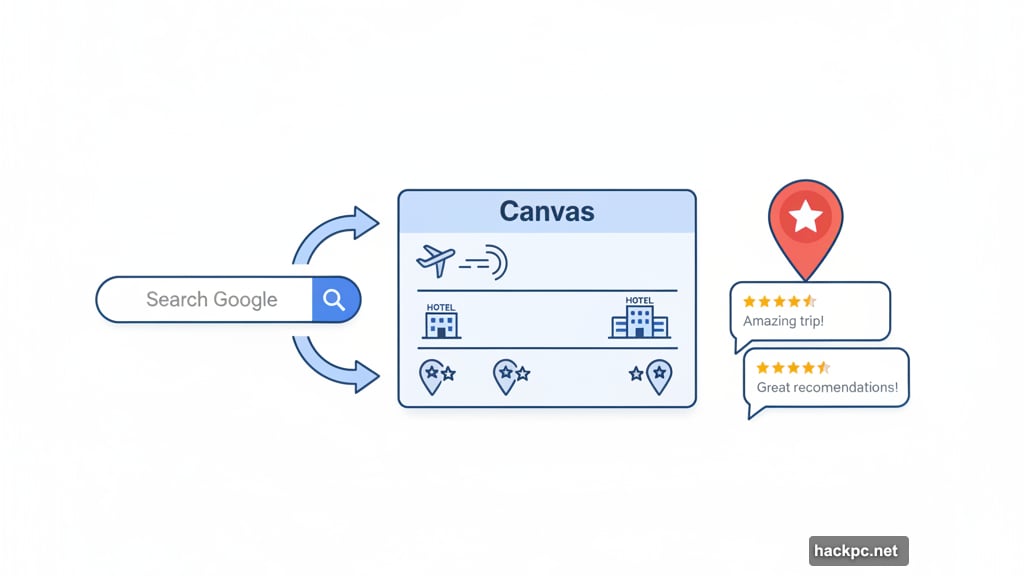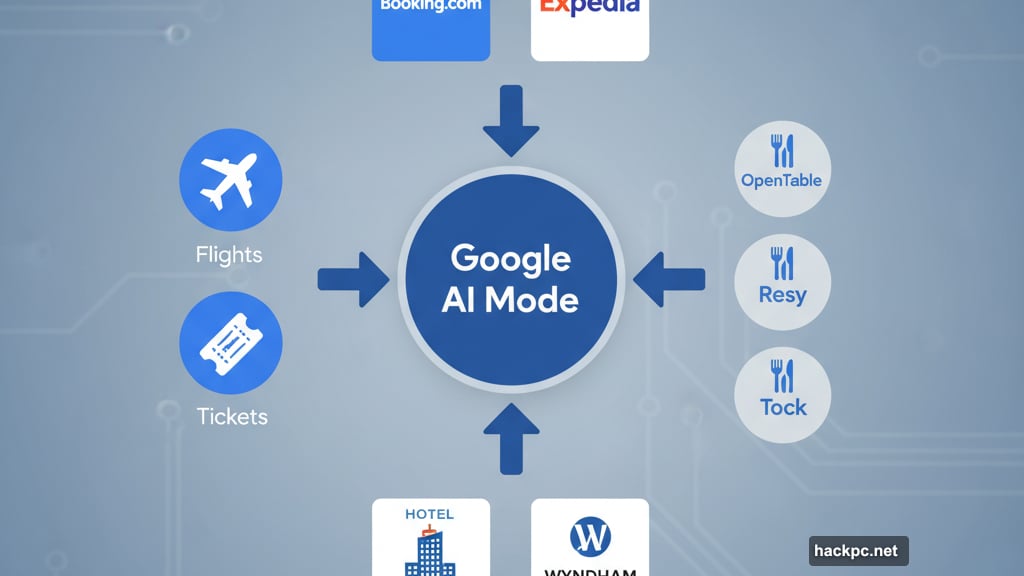
Google’s AI Mode now builds entire trip plans for you. Click one button and watch it generate flights, hotels, and daily itineraries in seconds.
This isn’t a chatbot suggestion list. It’s a full travel planning workspace that taps into Google’s massive database of flights, hotels, and local activities. Plus, it learns from your questions and refines plans in real time.
The feature rolled out to US users who opted into AI Mode Labs. But the implications reach far beyond early adopters.
Canvas Makes Trip Planning Visual
Google’s Canvas tool transforms AI Mode from text responses into an interactive planning workspace. Describe your trip and select “Create with Canvas.” The system builds a side panel itinerary complete with flight options, hotel suggestions, and activity recommendations.
The generated plans include photos and reviews pulled from Google Maps. So you’re not just seeing hotel names. You see what rooms look like and what previous guests actually thought.
Moreover, the itinerary updates dynamically. Ask for cheaper hotel options or activities closer to your hotel. Canvas rebuilds the plan immediately without starting over.
All drafted plans save to your AI Mode history. That means you can return later to compare different trip versions or share plans with travel companions.
Agent Booking Expands Beyond Events
Google’s agentic booking already handled event tickets and local appointments for Labs users. Now it’s adding restaurant reservations for all US users.
The system shows booking options with direct links to partners like OpenTable, Resy, and Tock. You pick what works. The AI handles finding availability and presenting choices.
But here’s where it gets interesting. Google partnered with Booking.com, Expedia, Marriott, and Wyndham to eventually roll out agentic booking for flights and hotels too. That moves beyond simple search into actual transaction handling.

The company also expanded its AI-powered Flight Deals feature worldwide. Previously available in just three countries, it now supports over 200 countries and 60 languages.
Travel Companies Just Lost Their Moat
This announcement puts pressure on dedicated travel platforms. Kayak and Expedia built businesses on aggregating travel options and simplifying booking.
Google already dominates the starting point for most travel research. Now it’s eliminating the need to visit other sites entirely. Why leave Google when it can plan everything and facilitate bookings directly?
Those companies saw this coming. Both launched their own AI-powered planning features recently. But they’re fighting an uphill battle against Google’s search dominance and comprehensive data.
The integrated experience matters more than individual features. Google combines search, maps, reviews, and booking in one place. Competitors need multiple partnerships to match that breadth.

The Bigger Picture on AI Agents
Google frames this as helpful automation. Search for “weekend getaway ideas.” Get a complete plan instead of a list of links.
But it fundamentally changes how people use the internet. Instead of visiting multiple sites to research and compare, users delegate entire workflows to Google’s AI.
That benefits Google enormously. Every interaction stays within their ecosystem. They collect more data. They control the user experience end-to-end. And they position themselves between users and service providers.
Other tech giants are pursuing similar strategies. Amazon and Perplexity recently launched AI-powered browsers. Microsoft built Copilot into Windows. Everyone wants to become the AI interface layer between users and the web.
The question isn’t whether AI agents are useful. They clearly save time and effort. The question is whether concentrating that much control in a few companies creates problems we’ll regret later.

What This Means for Travelers
For now, the tool offers genuine value. Planning trips takes hours of research across multiple sites. An AI that drafts complete itineraries in seconds has obvious appeal.
The quality depends on Google’s data accuracy and AI reliability. Hallucinations or outdated information could send travelers to closed restaurants or unavailable hotels. Early users should verify suggestions before booking.
Privacy matters too. Every trip plan you create teaches Google more about your preferences, budget, and travel patterns. That data becomes part of their advertising and recommendation algorithms.
Still, convenience usually wins. Most people will happily trade some privacy for significantly easier trip planning. Especially if the AI delivers genuinely useful results.
Just remember what you’re trading. And verify the AI’s suggestions before you book that flight.



Comments (0)